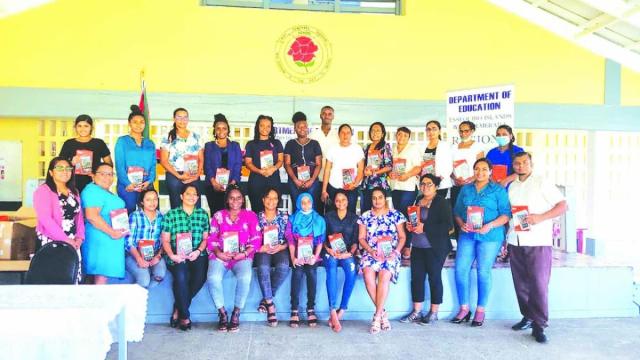…28 teachers from 18 schools participate

The Education Ministry Disaster Risk Prevention and Migrant Support Unit recently conducted a two-day English as a Second Language (ESL) workshop, which saw the participation of 28 teachers from 18 schools from both Regions Three (Essequibo Islands-West Demerara) and Seven (Cuyuni-Mazaruni).
As a mitigating response to eliminate the language barriers, the Ministry introduced the ESL training for teachers. The training equips teachers with the skills to support migrant learners and to provide linguistic support to returning Guyanese, Venezuelan and indigenous children to aid their integration into the education system.
ESL is usually taught to students whose primary language is not English to improve their speaking, writing and listening skills.
The coordinator of the programme, Rampattie Prashad-Bisnauth, said the ministry recognised the gap between migrant children and as such, the programme was initiated.
“Therefore, in keeping with the 2030 vision for the education sector – providing opportunities for quality, equitable education and lifelong learning for all, the Ministry has been working to reduce the disparities for migrant learners by promoting the inclusion of all school-aged migrant children in Guyana’s education system and ensure that migrants have equitable access to education regardless of their legal status, nationality or citizenship in keeping with international standards,” Prashad-Bisnauth said.
She also noted that the training session was one of many to roll out to provide a more inclusive, sustainable and long-term solution to address challenges faced by non-English-speaking children across the 11 education districts in the country.
Additionally, she stated that the main focus of the training was to improve the ESL skills of teachers and ultimately provide migrant learners with the necessary support to help them cope with culture shock and daily challenges in and out of school, thereby increasing the probability of a more successful integration process in schools.
At the end of the training sessions, each school that participated received six electronic tablets which included pre-downloaded software such as a translator app which can translate words, text, or voice recordings and can work without an internet connection.
The devices were donated by the United Nations High Commissioner for Refugees (UNHCR) to aid with the current after-school programme in schools in Regions One, Three and Seven.
Discover more from Guyana Times
Subscribe to get the latest posts sent to your email.











